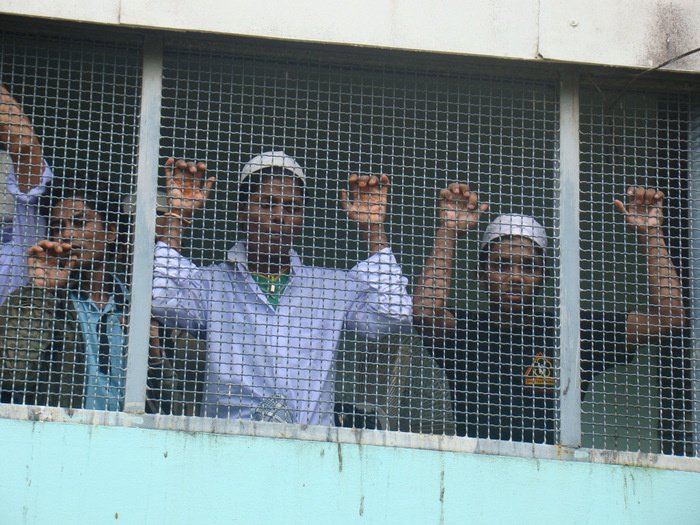Human trafficking to carry death penalty

– Thailand news selected by Gazette editors for Phuket’s international community
PHUKET: Parliament voted overwhelmingly yesterday to introduce harsher punishments for human traffickers, including life imprisonment and the death penalty in cases where their victims had died.
The National Legislative Assembly (NLA) voted to amend the country’s Anti-Trafficking in Persons Act in the third reading.
The changes will allow prosecutors to seek the death penalty and fines of up to 400,000 for those convicted of trafficking offences, Pol Gen Chatchawan Suksomjit said.
The overhaul of the Anti-Trafficking in Persons Act follows an incident in January when one woman was found dead in the back of one of five vehicles being used to traffick 98 Rohingya through Phang Nga, north of Phuket, and intercepted by police in Nakhon Sri Thammarat (story here).
Dozens of children – 42 boys and girls under the age of 14 – were also among the suspected trafficking victims from Myanmar.
Two Thai drivers suspected of trafficking the Rohingya, a mostly stateless Muslim minority from western Myanmar, were interrogated over the incident.
In 2012, four Thais found guilty of human trafficking were sentenced to between three and 10 years’ imprisonment (story here) for their intricate involvement in the 2008 “death truck” that left 54 Burmese dead from suffocation inside a seafood container bound for Phuket.
Of the 121 Burmese found in the sealed container heading from Ranong, 17 men, 36 women and one 8-year-old girl were found dead (story here).
Report on fishermen abuse hurts Thailand
While expressing confidence in the measures to combat human trafficking, the government yesterday admitted that fresh reports on forced workers being found on Thai trawlers in Indonesia could hurt Thailand when the United State’s new Trafficking in Persons (TIP) report is released this year.
The US yesterday expressed concern over forced laborers being found in Indonesia’s Ambon and Benjina islands and nearby islands, calling on the government to take significant efforts to protect them.
Deputy Foreign Minister Don Pramudwinai conceded that reports on the issue by international and local news agencies had not helped Thailand in terms of the pending TIP report.
Furthermore, if the European Union also considered the use of the forced laborers a violation of the illegal, unreported and unregulated fishing regulations, it would lead to repercussions on the fishery industry, he said.
The US State Department spokeswoman, Jen Psaki, said workers in the fishing industry, many of them migrants, were exploited at multiple points along the supply chain from harvesting to processing.
“And a significant – as it relates to Thailand, a significant portion – proportion of trafficking victims are found in the seafood industry,” she said in a daily briefing.
“So for several years, the international community, including the United States, has expressed concern publicly – also directly, of course – over the forced labor of foreign migrants in the Thai fishing and on-land seafood industries. And we continue to call on the Thai Government to take significantly greater steps to protect foreign migrants in the fishing and shrimp industries and to punish those who are enslaving workers.”
Asked if the recent media reports could significantly impact on the review of Thailand in the TIP report, Ms Psaki said: “We don’t make predictions like that. We do note concerns where we have them, and certainly the issue of fishing practices in Thailand has been noted in previous reports.”
Failed efforts
Previous media reports stated that Thai and Myanmar fishery workers were forced to work in harsh conditions on the water and some were detained on Indonesian islands. The seafood they catch was exported by Thailand, the reports said.
The authorities said they had put a lot of effort into trying to solve the problem and had rescued many of the abused workers and sent them home.
Deputy Prime Minister Prawit Wongsuwan yesterday met a rescue team at his office to instruct them to help the some 700 forced laborers in Indonesia.
He said he had no idea how the migrants ended up on the trawlers as all Thai trawlers were registered and checked in and out ports. The trawlers could also be traced by GPS, he said.
He said he would talk to the Indonesian government to discuss bring the workers back to Thailand as soon as possible.
It was reported that a group of 21 workers would arrive in the Kingdom this evening.
Deputy Foreign Minister Don said he would ask the owners of the trawlers for information in order to map out necessary measure to tackle the issue.
“We are confident that our sincere efforts to tackle the problem will encourage the concerned agencies to work effectively as well as convince the international community to ease their measures against Thailand,” he said.
Dodging ramifications
Thailand hopes to convince Washington that its efforts over the past nine months since the last TIP’s report was released were enough to upgrade the country from the TIP’s tier three – the lowest rating.
The government reported to the US earlier that the implementation of five crucial strategies, the so-called 5Ps – policy and mechanisms, prosecution, prevention, protection, and partnership – had yielded good results.
Minister Don said the government was preparing a new report on the progress of combating human trafficking in Thailand and would submit it to the US this month.
Washington will have two months to review the report before announcing its TIP ratings in June.
Don said the government had to verify information contained in the media reports about the situation in Indonesia and consult with relevant parties in Washington as well as he EU over the IUU regulation.
— Phuket Gazette Editors
Latest Thailand News
Follow The Thaiger on Google News:


























